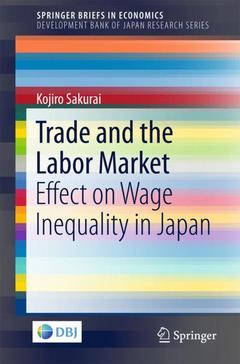Trade and the Labor Market, 1st ed. 2017 Effect on Wage Inequality in Japan Development Bank of Japan Research Series
Langue : Anglais
Auteur : Sakurai Kojiro

This book presents an integrated overview and evidence, taking Japan as an example, on how international trade, especially with developing countries, affects labor market in developed countries, which has been keenly debated among international and labor economists since the late 1980s. The unique point of this book is that it integrates international trade and labor market into the same framework. The analysis includes both theory and empirical study. It especially pays attention to wage inequality between skilled and unskilled labor represented by nonproduction and production workers, and college graduates and high-school graduates. The estimation method used is to analyze input-output tables containing 55 manufacturing industries during the period 1995-2005, and to measure factor content of trade using these tables.
Main results are as follows: First, both relative wage and relative employment of nonproduction to production workers, and college graduates to high-school graduates increased as a trend since the 1980s, suggesting a relative demand shift toward skilled labor. Second, analysis using input-output tables revealed that employment reduction due to increased imports is greater in production workers than in nonproduction workers, and that employment increase due to increased exports is greater in nonproduction workers than in production workers, suggesting the comparative advantage being at work in line with the Heckscher-Ohlin-Samuelson model. Third, analysis using factor content of trade revealed that increased trade during 1995-2005 especially with Asian countries raised the relative wage of nonproduction to production workers in the aggregated manufacturing sector by 0.023 points (1.400 to 1.422), or by 1.6 percent in terms of rate of change. This estimation result suggests that increased trade in this period played a certain role in widening wage inequality between nonproduction to production workers. These results contribute to a deeper understanding of the effect of globalization on labor market in the field of economics.
1 Introduction.- 2 Basic Facts.- 3 Effect of Trade on Employment.- 4 Effect of Trade on Wages.- 5 Concluding Remarks.
Kojiro Sakurai is a professor of economics at Senshu University and visiting scholar of the Research Institute of Capital Formation, Development Bank of Japan. His main areas of research are labor economics, international economics and Japanese economy. Born in 1956, Prof. Sakurai received a Bachelor’s degree in Economics from Hitotsubashi University in 1980, a Master’s degree in Economics from Yale University in 1984, and a Doctor’s degree in Economics from Hitotsubashi University in 2008. He was appointed Professor of Economics at Senshu University in 2007, after working for the Research Institute of Capital Formation, DBJ, as Chief Economist.
Integrates international economics and labor economics
Calculates factor content of trade
Uses 55 manufacturing industries data
Includes supplementary material: sn.pub/extras
Date de parution : 09-2017
Ouvrage de 106 p.
15.5x23.5 cm
Thème de Trade and the Labor Market :
© 2024 LAVOISIER S.A.S.



